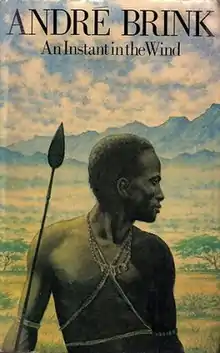An Instant in the Wind
An Instant in the Wind (Afrikaans: 'n Oomblik in die Wind) is a 1975 novel by André Brink which was shortlisted for the Man Booker Prize.[1] Set in 1751, the novel focuses on the relationship of a white woman and a black slave.[1][2] Kirkus Reviews describes the novel as beginning with conflict, but quickly descending into "sensual, cerebral dialogues on love and personhood."[2]

(publ. W. H. Allen & Co.)
Because Brinks's 1973 novel Looking on Darkness was banned by the Apartheid government, the novel was initially published privately for subscribers only.[1]
Critical reception
Reviewing the novel in 1976, Kirkus Reviews described the novel as a success, writing that "Even Poitier and Jane Fonda couldn't carry off these explorations [into love and personhood], although some readers will relish the torrid zones."[2] The New York Times reviewer Raymond A. Sokolov described the novel as an indicator of the "cracks appearing in the South African wall of racism."[3] Sokolov emphasizes how the novel is more about " political acts of defiance", writing that the novel is a "overwritten [and] hackneyed love story that drags on and on through long passages of tedious landscape descriptions and stilted romantic interchanges."[3]
References
- "André Brink, novelist - obituary". The Telegraph (UK). 10 February 2015.
- "AN INSTANT IN THE WIND by Andre Brink". Kirkus Reviews. Retrieved 2 April 2016.
- Sokolov, Raymond A. (27 February 1977). "Review". The New York Times Books.
Further reading
- Wenzel, Marita (August 2001). "Reading the ideological subtext in André Brink's An Instant in the Wind and Patrick White's A Fringe of Leaves". Literator. 22 (2): 61–75. ISSN 0258-2279.
- Cho, Peggy C (31 December 2011). "André Brink's An Instant in the Wind: A Post-colonial Revision of the Captivity Myth" (PDF). 영미문화 제. 11 (3). Archived from the original (PDF) on 17 April 2016.